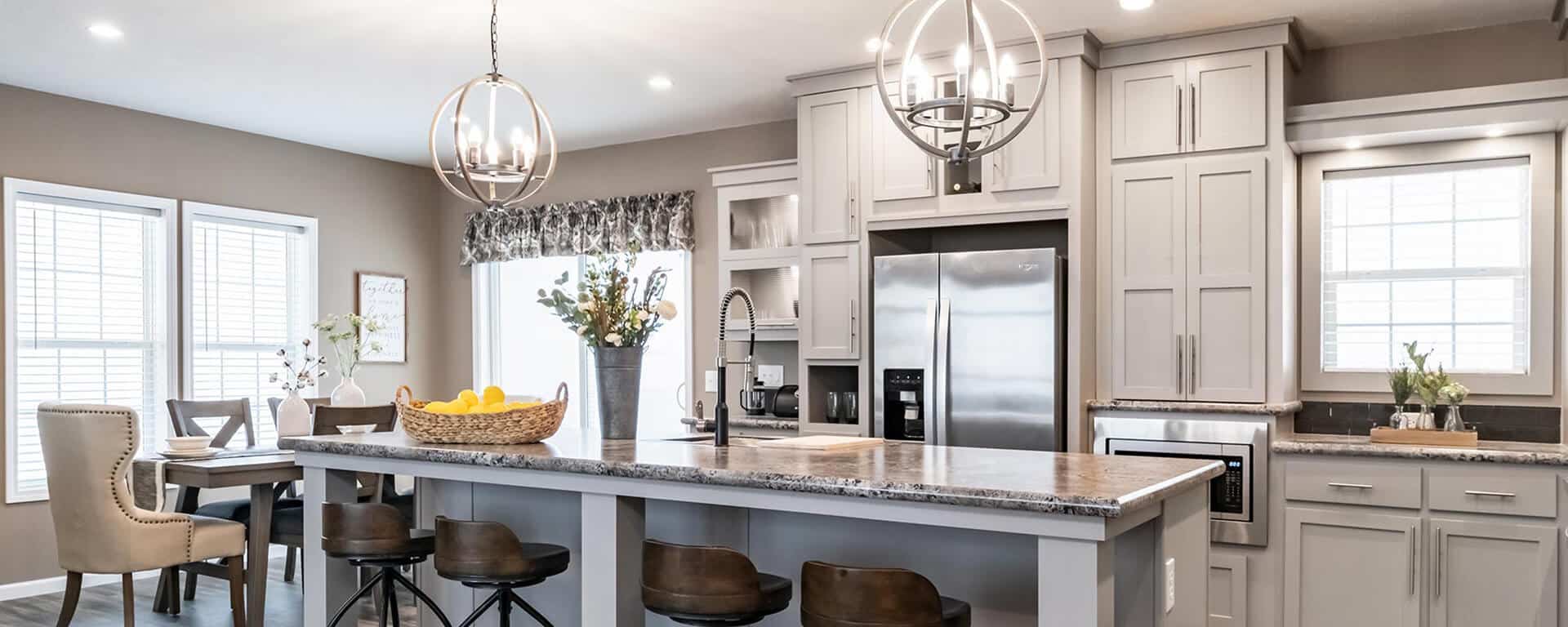How To Finance A Mobile Home: Your Complete Guide To Manufactured Home Loans
Smartsites webuser
may 1, 2024

Understanding mobile home financing can be a unique process compared to purchasing a traditional stick-built house. Mobile homes, or manufactured homes, offer a cost-effective housing alternative, yet require specific financial considerations. Firstly, it’s crucial to understand that loans for mobile homes can come from different sources including personal property loans, chattel loans, and mortgages, depending on whether the home is attached to a permanent foundation.
Buyers should start by assessing their financial situation, checking their credit score, and determining their budget for down payment and monthly payments. Lenders typically look for a credit score of 620 or higher for manufactured home loans, and interest rates can vary widely based on your credit history and the type of loan you choose.
Types of Loans for Manufactured Homes
- Chattel Loans: These are the most common types of mobile home financing that are not permanently affixed to real estate. Chattel loans are personal property loans that have a shorter term and higher interest rates compared to traditional mortgages. They are generally quicker to process but may require a higher down payment.
- FHA Loans: The Federal Housing Administration offers loans for manufactured homes, including those not on permanent foundations. FHA loans allow lower credit scores and down payments as low as 3.5 percent. They require that the home meet specific safety and livability standards and must be your primary residence.
- VA Loans: For veterans and active military members, VA loans provide an excellent option with potentially no down payment. These loans also require the home to be affixed to a permanent foundation and must meet VA standards.
- Conventional Mortgages: If the manufactured home is permanently attached to land that you own, it might qualify for a conventional mortgage. This type of loan typically requires a higher credit score and a lower debt-to-income ratio but offers longer terms and potentially lower interest rates.
Preparing for the Loan Application Process
When preparing for the loan application process, it’s essential to meticulously organize and review all the financial documentation that will be required by lenders. This thorough preparation goes beyond simply collecting documents; it involves ensuring that the information presented will paint a clear and positive picture of your financial health. Recent pay stubs, tax returns, and bank statements should be up-to-date and accurately reflect your income and spending habits. Additionally, include documentation of any supplemental income or financial gifts, as these can strengthen your application by showing more robust financial resources.
Improving your credit score is another critical step in this preparation phase. This can be achieved by consistently making timely payments on all credit obligations and keeping your credit utilization low. Regularly checking your credit report for errors and addressing them promptly can also positively affect your score. These efforts show lenders that you are a responsible borrower, thereby increasing your attractiveness as a loan candidate.
Furthermore, focusing on reducing your existing debts can greatly improve your debt-to-income ratio, a key factor that lenders consider. Avoid taking on new credit obligations, such as opening new credit card accounts or making large purchases on credit, as these can temporarily lower your credit score.
Choosing the Right Lender for Your Manufactured Home
Selecting the right lender is crucial in securing an affordable loan for a mobile home. It’s important to compare offers from multiple lenders including banks, credit unions, and specialized manufactured home lenders. Be sure to evaluate the total cost of the loan, including interest rates, fees, and any penalties for early repayment. Understanding all terms and conditions of your loan agreement is critical to avoid unexpected costs. Opting for lenders who specialize in manufactured homes can be beneficial as they are familiar with the specific challenges and requirements of financing these types of homes.
Navigating Loan Terms and Interest Rates
Understanding the terms and interest rates associated with mobile home loans is crucial for making an informed decision. Interest rates on manufactured home loans can be higher than those for traditional homes, especially if the home is not permanently attached to land. The terms of the loan can also vary significantly.
Chattel loans, for example, typically have terms ranging from 15 to 20 years, much shorter than the 30-year terms common with conventional mortgages. It’s important to compare these terms and rates from various lenders to find the most cost-effective option. Be mindful of adjustable-rate loans, which might offer lower initial rates but can increase significantly over time, impacting your long-term financial stability.
Government Programs and Assistance
There are several government programs designed to assist in mobile home financing, which can make ownership more accessible and affordable. In addition to FHA and VA loans, the U.S. Department of Agriculture (USDA) offers loans and grants through its Rural Development program. These are intended for low-income buyers in rural areas and can be applied to manufactured homes under certain conditions.
These programs often come with specific requirements like geographical location, income levels, and whether the home meets certain energy efficiency and design standards. Taking advantage of these programs can significantly lower the cost of owning a mobile home, thanks to better interest rates and reduced down payment requirements.
Enhancing Home Value and Loan Approvability
Increasing the value of your mobile home and ensuring it meets certain standards can also improve your chances of loan approval and favorable terms. This includes making upgrades or improvements that enhance its safety, functionality, and aesthetic appeal. For instance, adding a permanent foundation can increase the home’s stability and make it eligible for more types of mobile home financing, such as a conventional mortgage.
Upgrading utilities, improving energy efficiency, and ensuring the home complies with the HUD Code for manufactured housing also contribute to its value and appeal to lenders. Properly maintaining your home not only ensures compliance with loan requirements but can also increase its resale value, making it a more viable investment.
Getting started is easy once you understand the basics and prepare adequately. The first step is to assess your financial situation and credit score, followed by researching the various loan options available. Gathering necessary documentation and improving your financial health will strengthen your loan application, making it more likely to be approved. Comparing different lenders and understanding the full terms of each loan offer is essential.
When you’re ready to move forward, reaching out to a lender that specializes in manufactured homes or utilizing the assistance programs available can provide you with the resources needed to secure your new home. Getting started on the path to mobile home ownership can be both exciting and rewarding with the right preparation and resources.
Evaluating Insurance and Long-Term Costs
Securing the right insurance for your mobile home is another essential step in the financing process. Mobile home insurance can differ significantly from standard homeowners insurance due to the unique risks involved, such as susceptibility to weather damage and issues related to the home’s construction and foundation type. It’s important to obtain insurance that covers not only the structure and personal property but also liability and possibly relocation, if necessary. Additionally, prospective homeowners should consider the long-term costs associated with mobile home ownership, including maintenance, utilities, property taxes, and potential lot rent if the home is located in a community. Understanding and planning for these expenses are crucial for maintaining financial stability and ensuring that the home remains a beneficial investment.
Building Credit and Financial Health
For many potential buyers, building a stronger credit profile is a critical step toward qualifying for better loan terms and interest rates. Practices such as paying down existing debt, making consistent, timely payments, and avoiding new credit inquiries can all help to improve your credit score over time. It’s also beneficial to review your credit report regularly and correct any inaccuracies. A healthier credit score not only aids in securing favorable financing but also impacts the overall financial aspects of purchasing a mobile home. The better your financial standing, the more options you will have for financing, and the lower your costs over the life of the loan.
The Role of Real Estate Agents in Mobile Home Purchases
Working with a real estate agent who specializes in mobile homes can be incredibly beneficial, especially for first-time buyers. These professionals understand the specifics of mobile home markets, including valuation, financing options, and legal considerations. They can guide you through the process of finding a home that meets your needs, negotiating prices, and ensuring that all legal requirements are met, including title transfer and proper registration. An experienced agent can also help navigate the complexities of mobile home communities, land leases, and zoning laws, which can be daunting for those unfamiliar with this sector of the real estate market.
Understanding the market trends and regulatory landscape for mobile homes is also crucial for potential homeowners. Market trends can influence both the pricing and availability of mobile homes, while local regulations may affect where and how you can place your home. Keeping informed about these factors will help you make strategic decisions regarding the purchase and placement of your mobile home. By staying updated on these trends and regulations, you can better anticipate changes that might affect your investment and ensure compliance with all local guidelines, ultimately protecting and enhancing the value of your mobile home.
Finding the right mobile home starts with understanding your needs and budget and then exploring the available options that meet those criteria. Researching different models, visiting mobile home communities, and comparing prices and features are all part of the journey to finding a mobile home that not only fits your lifestyle but also your financial goals. When you’re ready to take the next step, our extensive listings and resources can help you find your ideal mobile home.
We at Ignite MHC are dedicated to helping you navigate the world of mobile home ownership with ease and confidence. Whether you’re buying your first home or looking to invest in a mobile home community, our expert team is here to provide the support and resources you need. Visit us at Ignite MHC to learn more about how we can help you achieve your housing goals. Let us guide you through the process with professionalism and care, ensuring that you find the perfect home for your needs.
